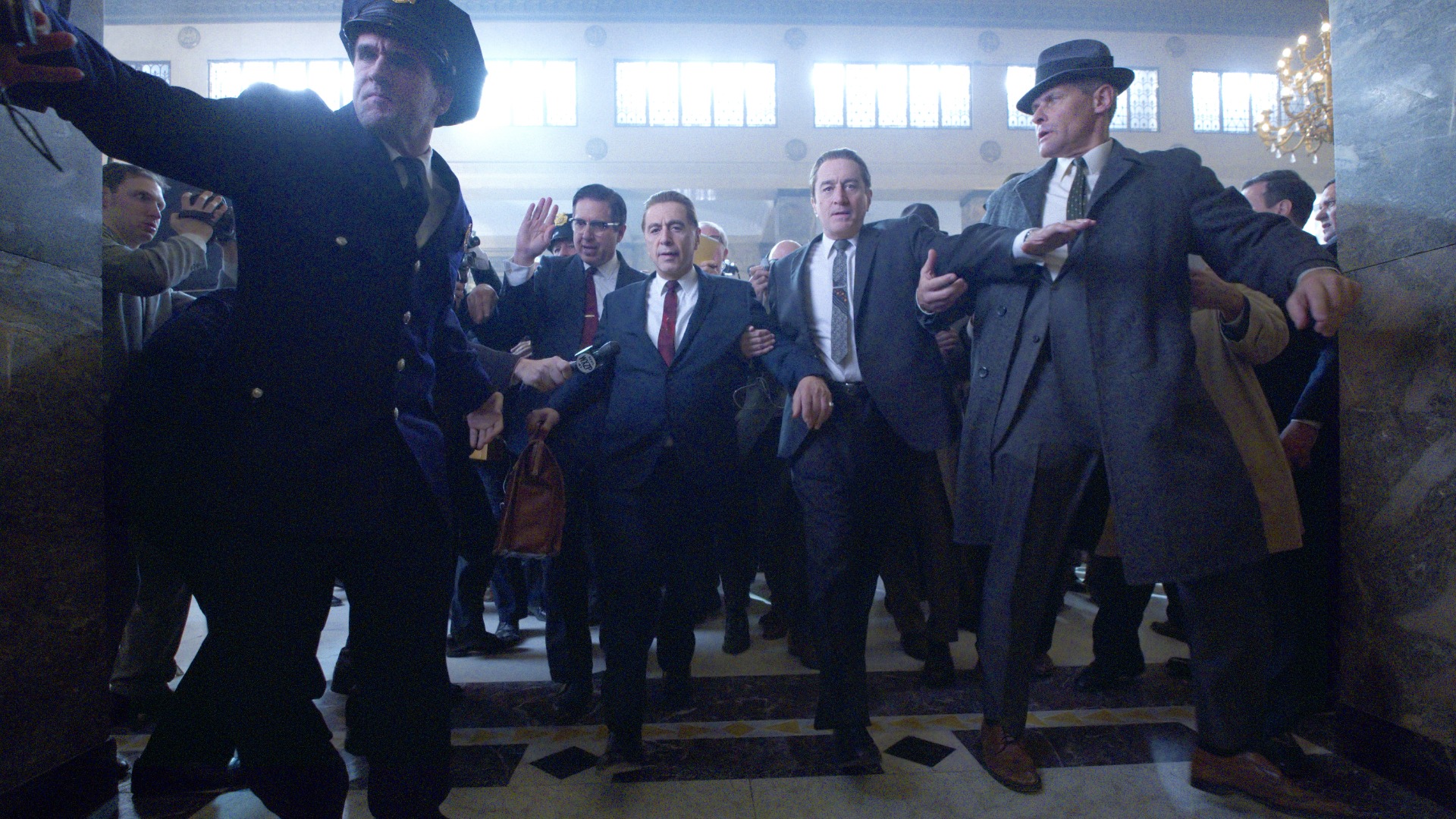GamesRadar+ Verdict
The ghosts of Scorsese’s past can be found in these gaunt GoodFellas. An engrossing and, yes, haunting epic.
Why you can trust GamesRadar+
De Niro, Pesci, Keitel. Wiseguys, gleaming Cadillacs, oversized pinkie rings, pistols clutched through brown paper bags, rolls of cash, doo-wop music, the Copacabana. The Irishman is, unmistakeably, a Martin Scorsese picture, the long, deep shadows of Mean Streets, GoodFellas and Casino stretching through much of its 209-minute running time. But it’s also colder and more distant than its predecessors, with the mob lifestyle rendered less glamorous, more utilitarian. Themes of ageing, guilt and death haunt the film. This is Scorsese’s summation, his twilight masterpiece, his Once Upon A Time In America.
Beginning in a Catholic care home in the early noughties, the titular Frank Sheeran (Robert De Niro), now in his eighties, looks back on a road trip he made with Pennsylvanian crime boss Russell Bufalino (Joe Pesci, terrific) and their wives in 1975. They are journeying towards a wedding in Detroit – and, it transpires, some rather bigger business en route – and from here we step further back in time to see how Sheeran, a meat-truck driver, becomes the Bufalino crime family’s trusted foot soldier and hitman.
One of Sheeran’s assignments is to babysit volatile Jimmy Hoffa (Al Pacino in his first gig for Scorsese and his best work since the ‘90s), whose Teamsters Union has great power and, naturally, underworld connections. Hoffa’s disappearance in July 1975 remains officially unsolved, though The Irishman, with its Steve Zaillian script based on Charles Brandt’s 2004 memoir I Heard You Paint Houses, presents Sheeran’s persuasive version of events.
Set primarily in the ‘50s, ‘60s and ’70s but stretching back to Sheeran’s service in Italy during World War Two, and occasionally checking back in with the noughties framing story, The Irishman picks at a Gordian knot of the personal and political, Washington legislature and organised crime. The Kennedys, Cuba, Castro, the Bay of Pigs, Nixon, Watergate… this at times feels like the cinematic equivalent of a James Ellroy novel, or a Godfather saga-style journey to the dark heart of America, minus the romanticism.
Tools match themes: the tracking shots and voiceover we’ve come to expect from Scorsese are present and correct but here put the steady in Steadicam and trade rat-a-tat exhilaration for broken, reflective words, while the whip-pans, crash zooms and freeze frames of GoodFellas are gone. The camera is always moving, but unhurriedly, gracefully, and the palette is wintry. This is a film that trades brio for quietude.
As for the fanfared de-aging effects, they are impressive rather than seamless, and there’s no hiding the cast’s stiff limbs even as the tech allows for their faces to belong in periods past (the recreations rival anything in Tarantino’s Once Upon a Time… In Hollywood). No matter: the force of the performances carry us through, and three-and-a-half hours glide by as Scorsese questions the noxious male ego - women are side-lined, but for a reason - and, for all the baptisms on show, the soulless actions of the mechanical men who make up the mob.
With sin comes sorrow, and a tremendous poignancy enters the picture as shootings and car bombings give way to strokes, arthritis and cancer, to regret, solitude and spiritual devastation. There is a great deal of humour in The Irishman, but the smiles of these murderers fade to pained grimaces to be taken to the grave.
Jamie Graham is the Editor-at-Large of Total Film magazine. You'll likely find them around these parts reviewing the biggest films on the planet and speaking to some of the biggest stars in the business – that's just what Jamie does. Jamie has also written for outlets like SFX and the Sunday Times Culture, and appeared on podcasts exploring the wondrous worlds of occult and horror.




